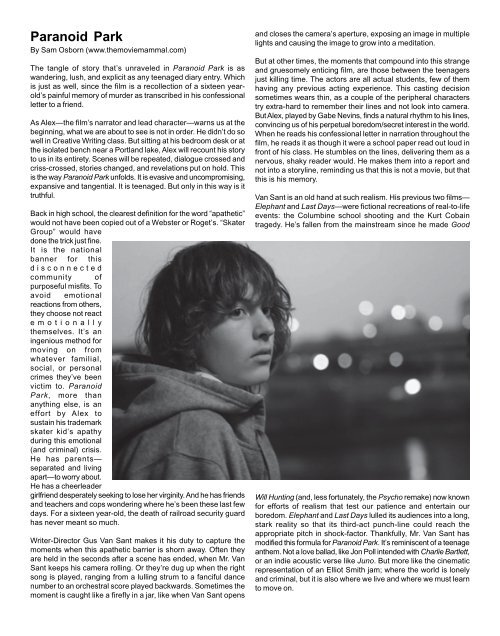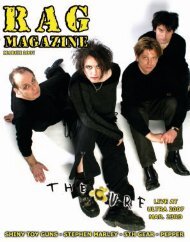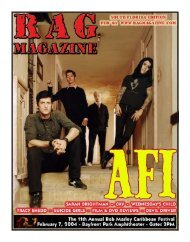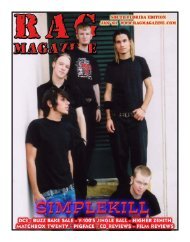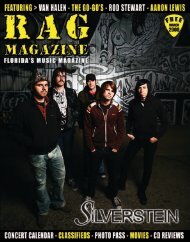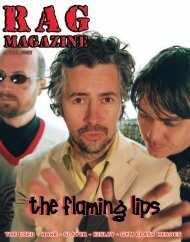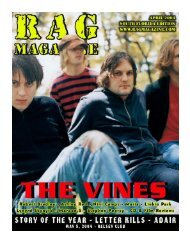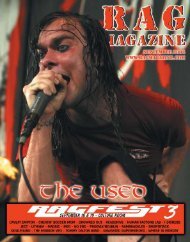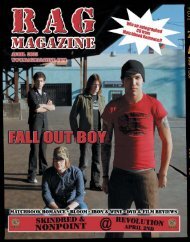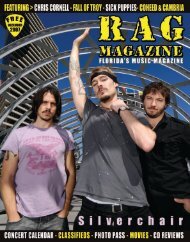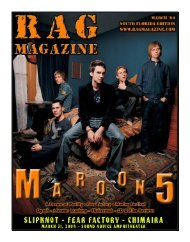April of 2008 - RAG Magazine
April of 2008 - RAG Magazine
April of 2008 - RAG Magazine
You also want an ePaper? Increase the reach of your titles
YUMPU automatically turns print PDFs into web optimized ePapers that Google loves.
Paranoid Park<br />
By Sam Osborn (www.themoviemammal.com)<br />
The tangle <strong>of</strong> story that’s unraveled in Paranoid Park is as<br />
wandering, lush, and explicit as any teenaged diary entry. Which<br />
is just as well, since the film is a recollection <strong>of</strong> a sixteen yearold’s<br />
painful memory <strong>of</strong> murder as transcribed in his confessional<br />
letter to a friend.<br />
As Alex—the film’s narrator and lead character—warns us at the<br />
beginning, what we are about to see is not in order. He didn’t do so<br />
well in Creative Writing class. But sitting at his bedroom desk or at<br />
the isolated bench near a Portland lake, Alex will recount his story<br />
to us in its entirety. Scenes will be repeated, dialogue crossed and<br />
criss-crossed, stories changed, and revelations put on hold. This<br />
is the way Paranoid Park unfolds. It is evasive and uncompromising,<br />
expansive and tangential. It is teenaged. But only in this way is it<br />
truthful.<br />
Back in high school, the clearest definition for the word “apathetic”<br />
would not have been copied out <strong>of</strong> a Webster or Roget’s. “Skater<br />
Group” would have<br />
done the trick just fine.<br />
It is the national<br />
banner for this<br />
disconnected<br />
community <strong>of</strong><br />
purposeful misfits. To<br />
avoid emotional<br />
reactions from others,<br />
they choose not react<br />
emotionally<br />
themselves. It’s an<br />
ingenious method for<br />
moving on from<br />
whatever familial,<br />
social, or personal<br />
crimes they’ve been<br />
victim to. Paranoid<br />
Park, more than<br />
anything else, is an<br />
effort by Alex to<br />
sustain his trademark<br />
skater kid’s apathy<br />
during this emotional<br />
(and criminal) crisis.<br />
He has parents—<br />
separated and living<br />
apart—to worry about.<br />
He has a cheerleader<br />
girlfriend desperately seeking to lose her virginity. And he has friends<br />
and teachers and cops wondering where he’s been these last few<br />
days. For a sixteen year-old, the death <strong>of</strong> railroad security guard<br />
has never meant so much.<br />
Writer-Director Gus Van Sant makes it his duty to capture the<br />
moments when this apathetic barrier is shorn away. Often they<br />
are held in the seconds after a scene has ended, when Mr. Van<br />
Sant keeps his camera rolling. Or they’re dug up when the right<br />
song is played, ranging from a lulling strum to a fanciful dance<br />
number to an orchestral score played backwards. Sometimes the<br />
moment is caught like a firefly in a jar, like when Van Sant opens<br />
and closes the camera’s aperture, exposing an image in multiple<br />
lights and causing the image to grow into a meditation.<br />
But at other times, the moments that compound into this strange<br />
and gruesomely enticing film, are those between the teenagers<br />
just killing time. The actors are all actual students, few <strong>of</strong> them<br />
having any previous acting experience. This casting decision<br />
sometimes wears thin, as a couple <strong>of</strong> the peripheral characters<br />
try extra-hard to remember their lines and not look into camera.<br />
But Alex, played by Gabe Nevins, finds a natural rhythm to his lines,<br />
convincing us <strong>of</strong> his perpetual boredom/secret interest in the world.<br />
When he reads his confessional letter in narration throughout the<br />
film, he reads it as though it were a school paper read out loud in<br />
front <strong>of</strong> his class. He stumbles on the lines, delivering them as a<br />
nervous, shaky reader would. He makes them into a report and<br />
not into a storyline, reminding us that this is not a movie, but that<br />
this is his memory.<br />
Van Sant is an old hand at such realism. His previous two films—<br />
Elephant and Last Days—were fictional recreations <strong>of</strong> real-to-life<br />
events: the Columbine school shooting and the Kurt Cobain<br />
tragedy. He’s fallen from the mainstream since he made Good<br />
Will Hunting (and, less fortunately, the Psycho remake) now known<br />
for efforts <strong>of</strong> realism that test our patience and entertain our<br />
boredom. Elephant and Last Days lulled its audiences into a long,<br />
stark reality so that its third-act punch-line could reach the<br />
appropriate pitch in shock-factor. Thankfully, Mr. Van Sant has<br />
modified this formula for Paranoid Park. It’s reminiscent <strong>of</strong> a teenage<br />
anthem. Not a love ballad, like Jon Poll intended with Charlie Bartlett,<br />
or an indie acoustic verse like Juno. But more like the cinematic<br />
representation <strong>of</strong> an Elliot Smith jam; where the world is lonely<br />
and criminal, but it is also where we live and where we must learn<br />
to move on.


